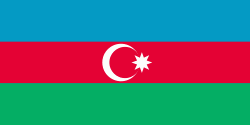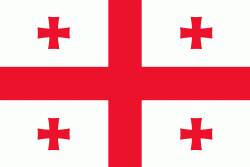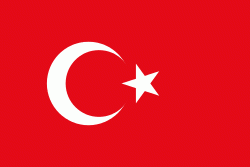Azerbaijani language
Azerbaijani or Azeri, also referred to as Azeri Turkic or Azeri Turkish, is a Turkic language from the Oghuz sub-branch spoken primarily by the Azerbaijani people, who live mainly in the Republic of Azerbaijan where the North Azerbaijani variety is spoken, and in the Azerbaijan region of Iran, where the South Azerbaijani variety is spoken. Although there is a very high degree of mutual intelligibility between both forms of Azerbaijani, there are significant differences in phonology, lexicon, morphology, syntax, and sources of loanwords.
North Azerbaijani has official status in the Republic of Azerbaijan and Dagestan (a federal subject of Russia), but South Azerbaijani does not have official status in Iran, where the majority of Azerbaijani people live. It is also spoken to lesser varying degrees in Azerbaijani communities of Georgia and Turkey and by diaspora communities, primarily in Europe and North America.
Both Azerbaijani varieties are members of the Oghuz branch of the Turkic languages. The standardized form of North Azerbaijani (spoken in the Republic of Azerbaijan and Russia) is based on the Shirvani dialect, while South Azerbaijani uses the Tabrizi dialect as its prestige variety. Since the Republic of Azerbaijan's independence from the Soviet Union in 1991, Northern Azerbaijani uses the Latin script. South Azerbaijani, on the other hand, has always used and continues to use the Perso-Arabic script. Azerbaijani language is closely related to Gagauz, Qashqai, Crimean Tatar, Turkish, and Turkmen, sharing varying degrees of mutual intelligibility with each of those languages.
Historically the language was referred by its native speakers as türk dili or türkcə, meaning either "Turkish" or "Turkic". After the establishment of the Azerbaijan SSR, on the order of Soviet leader Joseph Stalin, the "name of the formal language" of the Azerbaijan SSR was changed from "Turkish" to "Azerbaijani". The language is usually referred to as Turki or Torki in Iranian Azerbaijan.
North Azerbaijani has official status in the Republic of Azerbaijan and Dagestan (a federal subject of Russia), but South Azerbaijani does not have official status in Iran, where the majority of Azerbaijani people live. It is also spoken to lesser varying degrees in Azerbaijani communities of Georgia and Turkey and by diaspora communities, primarily in Europe and North America.
Both Azerbaijani varieties are members of the Oghuz branch of the Turkic languages. The standardized form of North Azerbaijani (spoken in the Republic of Azerbaijan and Russia) is based on the Shirvani dialect, while South Azerbaijani uses the Tabrizi dialect as its prestige variety. Since the Republic of Azerbaijan's independence from the Soviet Union in 1991, Northern Azerbaijani uses the Latin script. South Azerbaijani, on the other hand, has always used and continues to use the Perso-Arabic script. Azerbaijani language is closely related to Gagauz, Qashqai, Crimean Tatar, Turkish, and Turkmen, sharing varying degrees of mutual intelligibility with each of those languages.
Historically the language was referred by its native speakers as türk dili or türkcə, meaning either "Turkish" or "Turkic". After the establishment of the Azerbaijan SSR, on the order of Soviet leader Joseph Stalin, the "name of the formal language" of the Azerbaijan SSR was changed from "Turkish" to "Azerbaijani". The language is usually referred to as Turki or Torki in Iranian Azerbaijan.
Country
-
Azerbaijan
Azerbaijan (, ; Azərbaycan ), officially the Republic of Azerbaijan, is a transcontinental country located at the boundary of Eastern Europe and Western Asia. It is a part of the South Caucasus region and is bounded by the Caspian Sea to the east, Russia (Republic of Dagestan) to the north, Georgia to the northwest, Armenia and Turkey to the west, and Iran to the south. Baku is the capital and largest city.
The Azerbaijan Democratic Republic proclaimed its independence from the Transcaucasian Democratic Federative Republic in 1918 and became the first secular democratic Muslim-majority state. In 1920, the country was incorporated into the Soviet Union as the Azerbaijan SSR. The modern Republic of Azerbaijan proclaimed its independence on 30 August 1991, shortly before the dissolution of the Soviet Union in the same year. In September 1991, the ethnic Armenian majority of the Nagorno-Karabakh region formed the self-proclaimed Republic of Artsakh. The region and seven surrounding districts are internationally recognized as part of Azerbaijan pending a solution to the status of the Nagorno-Karabakh through negotiations facilitated by the OSCE, although became de facto independent with the end of the First Nagorno-Karabakh War in 1994. Following the Second Nagorno-Karabakh War in 2020, the seven districts and parts of Nagorno-Karabakh were returned to Azerbaijani control. -
Georgia
Georgia (საქართველო, ) is a transcontinental country at the intersection of Eastern Europe and Western Asia. It is part of the Caucasus region, bounded by the Black Sea to the west, Russia to the north and northeast, Turkey to the southwest, Armenia to the south, and by Azerbaijan to the southeast. The country covers an area of 69700 km2, and has a population of 3.7 million people. Tbilisi is its capital and largest city, home to roughly a third of the Georgian population.
During the classical era, several independent kingdoms became established in what is now Georgia, such as Colchis and Iberia. In the early 4th century, ethnic Georgians officially adopted Christianity, which contributed to the spiritual and political unification of the early Georgian states. In the Middle Ages, the unified Kingdom of Georgia emerged and reached its Golden Age during the reign of King David IV and Queen Tamar in the 12th and early 13th centuries. Thereafter, the kingdom declined and eventually disintegrated under the hegemony of various regional powers, including the Mongols, the Turks, and various dynasties of Persia. In 1783, one of the Georgian kingdoms entered into an alliance with the Russian Empire, which proceeded to annex the territory of modern Georgia in a piecemeal fashion throughout the 19th century. -
Turkey
Turkey (Türkiye ), officially the Republic of Türkiye (Türkiye Cumhuriyeti ), is a transcontinental country located mainly on the Anatolian Peninsula in Western Asia, with a small portion on the Balkan Peninsula in Southeast Europe. It shares borders with the Black Sea to the north; Georgia to the northeast; Armenia, Azerbaijan, and Iran to the east; Iraq to the southeast; Syria and the Mediterranean Sea to the south; the Aegean Sea to the west; and Greece and Bulgaria to the northwest. Cyprus is located off the south coast. Turks form the vast majority of the nation's population and Kurds are the largest minority. Ankara is Turkey's capital, while Istanbul is its largest city and financial centre.
One of the world's earliest permanently settled regions, present-day Turkey was home to important Neolithic sites like Göbekli Tepe, and was inhabited by ancient civilisations including the Hattians, Hittites, Anatolian peoples, Mycenaean Greeks, Persians and others. Following the conquests of Alexander the Great which started the Hellenistic period, most of the ancient regions in modern Turkey were culturally Hellenised, which continued during the Byzantine era. The Seljuk Turks began migrating in the 11th century, and the Sultanate of Rum ruled Anatolia until the Mongol invasion in 1243, when it disintegrated into small Turkish principalities. Beginning in the late 13th century, the Ottomans united the principalities and conquered the Balkans, and the Turkification of Anatolia increased during the Ottoman period. After Mehmed II conquered Constantinople (Istanbul) in 1453, Ottoman expansion continued under Selim I. During the reign of Suleiman the Magnificent, the Ottoman Empire became a global power. From the late 18th century onwards, the empire's power declined with a gradual loss of territories. Mahmud II started a period of modernisation in the early 19th century. The Young Turk Revolution of 1908 restricted the authority of the Sultan and restored the Ottoman Parliament after a 30-year suspension, ushering the empire into a multi-party period. The 1913 coup d'état put the country under the control of the Three Pashas, who facilitated the Empire's entry into World War I as part of the Central Powers in 1914. During the war, the Ottoman government committed genocides against its Armenian, Greek and Assyrian subjects. After its defeat in the war, the Ottoman Empire was partitioned.
